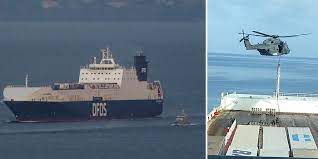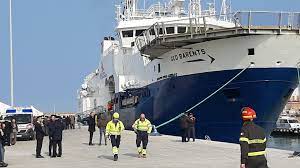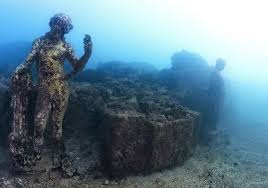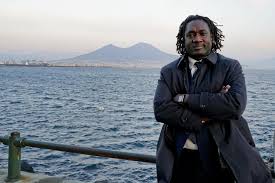Italy: Special Forces seize control of cargo ship carrying migrant stowaways

Rome: On Friday (June 9) Italian special forces were landed by helicopter on board a Turkish-flagged cargo ship.
Their mission, it was initially reported, was to overpower a group of about 15 migrants who were attempting to hijack the ship, armed with knives.
In fact, by Sunday (June 11) a slightly different account of events had emerged. The group of 13 men and 2 women are believed to have stowed away on the cargo ship Galatea Seaways and were first detected through security cameras.
Following detection, the crew locked themselves in the ship’s engine room where the ship’s captain radioed for help, according to news reports by the Italian news agency ANSA and the German news agency dpa. It was believed that the stowaways, reportedly from Afghanistan, Syria and Iraq, had allegedly attempted to take some of the sailors hostage, armed with knives.

A video report from the UK right-wing newspaper The Telegraph showed heavily armed Italian commandos dropping into the cargo ship via two helicopters.
A press statement on the Italian Defense Ministry website provided a timeline of the alleged hijacking and indicated that after a seven–hour military operation, security forces were able to take control of the ship, secure the 22 members of the crew, and apprehend the group of migrants, some of whom had barricaded themselves in the ship.
After the Italian authorities secured the ship, the Galatea Seaways was anchored at the port of Naples. There were no reported injuries.
Three of the group were charged with weapons possession. The two women, one of whom was pregnant, were taken to the hospital along with two other men, reported ANSA. The men were taken to a refugee reception center.
“There is no safe Italy if there is no safe Mediterranean,” Italian Defense Minister Guido Crosetto said in a statement, in which he thanked the special forces for their prompt action on Friday.
The 13 men and two women who allegedly attempted to take over the Galatea Seaways had reportedly boarded the cargo ship in the hope of reaching Europe.
The UK news agency The Guardian reported that people fleeing political persecution, war, and hardship are forced to take more hazardous routes to seek asylum in Europe in an attempt to avoid violence from security forces in the Balkans on land and the Libyan coast guard at sea.
In 2019, a merchant ship that had rescued about 108 people in the Mediterranean was involved in an attempted take over by a group of migrants on board after they realized the boat was going to take them back to Libya. The case, now known as El Hiblu 3, after the three migrants accused of being ring-leaders is still on going in Malta. The three men say they ended up trying to translate on behalf of the group and had no intention of hijacking the ship, or being violent. Numerous human rights organizations, including Amnesty International have been campaigining for their release and calling on Maltese prosecutors to drop all charges against the three young men.
The European Union has established joint patrols in parts of the Mediterranean through the European Border and Coast Guard Agency (Frontex) in a bid to control migration by sea. Currently, Frontex deploys three operations in the Mediterranean to apprehend smuggler networks and rescue migrants in distress.
Last February, Olivér Várhelyi, the European Commissioner for Neighborhood and Enlargement, handed over a search and rescue vessel to Libyan authorities for use by the Libyan Coast Guard. Four more vessels were planned to be turned over to Libya as part of initiatives to manage migrant crossings from North Africa.
International rights organization Human Rights Watch slammed the EU for not making “any apparent attempt to vet the human rights practices of the [Libyan] coast guard” and accused the European bloc of reneging on its primary responsibility of search and rescue in the Mediterranean.
“Instead, the EU and member countries have chosen to furnish money, vessels, training, and aerial surveillance to abusive Libyan armed groups so they can intercept and forcibly return people to Libya. There, these migrants face systematic and widespread abuses including torture, arbitrary detention, forced labor, and sexual assault,” Hanan Salah, Human Rights Watch Associate Director for the Middle East and North Africa Division wrote last February.
The Central Mediterranean route, which stretches from North Africa to Italy, and Malta, is the world’s most dangerous maritime crossing.
The UN Migration Agency,IOM documented 441 migrant deaths in the Central Mediterranean in the first quarter of 2023, making this year the deadliest first quarter on record since 2017.
The increasing number of deaths is attributed to reports of delays in state-led search and rescue operations and other obstacles to NGO-led rescue operations.
In February, Italy passed a law establishing a code of conduct for NGO ships despite wide criticism from the UN and other humanitarian groups. Also known as the “NGO decree,” the law tightens regulations governing humanitarian ship operations.
Read more: Geo Barents rescue ship detained and fined, ‘failed to provide information’
“The persisting humanitarian crisis in the central Mediterranean is intolerable,” said IOM Director General, António Vitorino in a statement.





